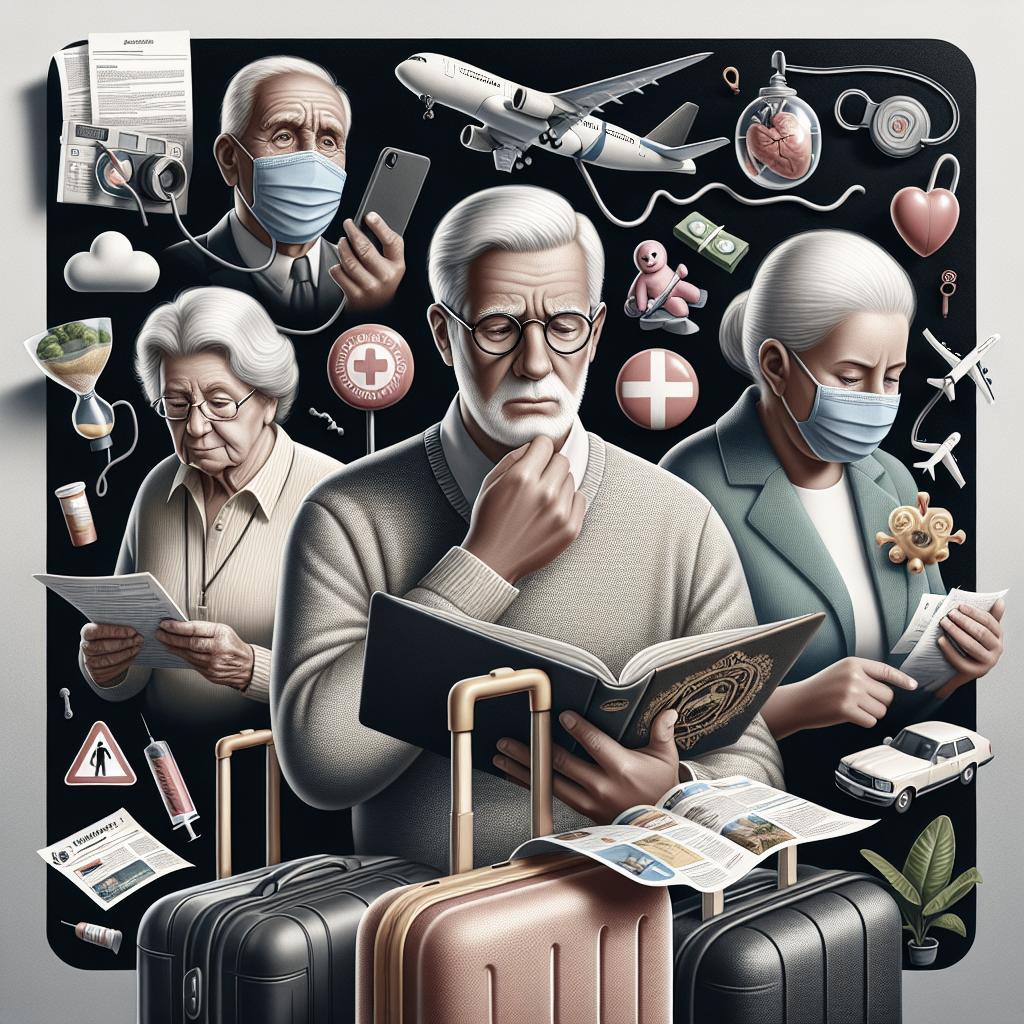Travel Safety Tips for Seniors
Traveling offers exciting experiences and new adventures for seniors but comes with unique challenges that require careful planning. Safety remains a top priority, and there are various ways older adults can prepare for and mitigate risks. This article covers essential tips for ensuring safety during travel, from selecting accommodations to managing health concerns. These guidelines help seniors navigate potential challenges and ensure that their trips are both safe and enjoyable. Additionally, we elaborate on the importance of health management, including mental well-being and how technology can play a pivotal role in supporting safe travels for seniors.
Key Takeaways
Travel safety for seniors involves careful planning, awareness, and appropriate health management. Prioritize health guidelines, secure accommodations, protect personal information, remain vigilant against theft, and keep important documents accessible. Moreover, understanding airport security and maintaining health during flights are crucial. Lastly, utilizing technology and being mindful of broader health management strategies can enhance travel experiences for seniors.
1. Follow Public Health Guidance
One of the most crucial aspects of traveling safely as a senior is adhering to public health guidance. As public health situations can evolve rapidly, it’s important to stay informed about the latest advice from health authorities. This includes understanding any travel restrictions, required vaccinations, and health advisories that might affect your destination. The Centers for Disease Control and Prevention (CDC) website provides updated information on travel recommendations.
Furthermore, seniors should ensure they are up to date with routine vaccinations and consider additional ones as advised by their healthcare provider based on the destination. Personal hygiene, such as regular hand washing and the use of sanitizers, remains integral. Carrying necessary personal protective equipment like masks and maintaining social distancing whenever possible, especially in crowded places, can significantly reduce the risk of illness during travel.
2. Choose a Hotel That Meets Your Needs
Accommodation plays a significant role in ensuring a comfortable and safe trip for seniors. When selecting a hotel, there are several factors to consider. Accessibility features such as ramps, elevators, and grab bars in bathrooms can significantly affect your stay. Moreover, check if the hotel offers services that cater to seniors, such as room service or daily housekeeping, which can make your stay more convenient.
Investigate the hotel’s safety features by reading reviews and checking its location during different times of the day. Hotels in well-lit and bustling areas are generally safer. Also, confirm the hotel’s policies, such as cancellation and booking flexibility, should an unexpected situation arise. Additionally, some hotels offer medical services or connections to nearby hospitals, which are beneficial should you need medical assistance.
3. Don’t Publicize Your Trip on Social Media
Social media can be tempting when it comes to sharing experiences with friends and family. However, publicizing your travel plans can inadvertently alert potential criminals to your absence from home, increasing the risk of home burglaries. It is best to share your travel adventures after returning home safely.
Moreover, avoid revealing your location during your trip. By sharing details such as your hotel’s name or the places you’re visiting in real-time, you risk exposing yourself to unnecessary dangers. Instead, use private messaging to keep in touch with trusted contacts and ensure someone reliable knows your itinerary and expected return date.
4. Know the TSA Rules
Understanding Transportation Security Administration (TSA) rules and procedures can help mitigate stress at the airport. Seniors aged 75 and older are eligible for expedited screening, which simplifies the process and reduces the need for physical strain due to security checks. Reviewing permissible items and packing your luggage accordingly can streamline your passage through security checkpoints.
Additionally, knowing what items require separate inspection will prepare you for quicker processing. Any medical supplies or mobility equipment should be declared, and knowing how to organize them can help you avoid potential issues. Keep TSA’s website in your bookmarks for the latest updates or changes to regulations before you travel.
5. Stay Healthy En Route to, and on, the Plane
Maintaining good health while traveling involves more than just physical health; mental and emotional well-being are also important. To combat jet lag and fatigue, prioritize rest before your journey and plan your itinerary to allow for adequate sleep. Airplane cabins can be dehydrating, so regularly drink water throughout your flight.
Additionally, sitting for extended periods can increase the risk of deep vein thrombosis (DVT). Regular movement, such as walking down the aisle or flexing your feet, can improve circulation. Bring snacks that align with your dietary needs and avoid excessive alcohol consumption, which can exacerbate dehydration.
6. Don’t Be a Target for Theft
To minimize the risk of theft, remain vigilant of your surroundings and secure personal valuables. Use a crossbody bag or money belt to keep essential items close to your body. Avoid carrying large sums of cash; opt for widely accepted credit or debit cards instead. Ensure you split your cash and cards between multiple secure locations, like hidden pockets or bags with zippers.
Moreover, avoid overly touristy behaviors such as using maps openly or displaying expensive electronics, as they can mark you as a target. Be cautious when approached by strangers and trust your instincts during any interaction that feels potentially threatening or intrusive.
7. Keep Important Documents on Hand
Having crucial travel documents organized and easily accessible is vital for smooth travel. Prepare a folder with copies of essential documents like passports, travel insurance, medical prescriptions, and emergency contacts. Consider digital backups through secure apps or cloud services, but bear in mind the importance of cybersecurity practices.
Keep original documents in a safe place while carrying photocopies with you. Furthermore, updating your emergency contact information and sharing it with family members or travel companions ensures swift communication in case of emergencies.
More Ways to Manage Your Health
4 Ways Pets Boost Our Physical Health as We Age
Caring for a pet offers multiple benefits to seniors, enhancing both mental and physical health. Pets can encourage an active lifestyle through regular walks and play, which promotes better cardiovascular health and decreases the likelihood of depression and anxiety. As travel companions, pets can present challenges, so prior planning is necessary, including understanding travel restrictions or pet-friendly accommodations.
Can AI Help Combat Social Isolation and Loneliness in Older Women?
AI technology has shown promise in addressing social isolation and loneliness, especially among older populations. Devices equipped with AI can facilitate effective communication, offer companionship, and even monitor health indicators. While traveling, using AI-enabled services like virtual assistants can provide seniors with a sense of connection and safety.
How AI and New Technology Could Support Healthy Aging
Emerging technologies offer numerous tools that support healthy aging, enhancing quality of life for seniors. Wearable health monitors and personal emergency response systems can offer reassurance and immediate assistance if needed while traveling. Seniors should be encouraged to embrace these technologies, ensuring they are comfortable with their use before embarking on trips.
Lessons Learned
| Tips | Description |
|---|---|
| Follow Public Health Guidance | Stay informed of health advisories and follow recommended safety protocols. |
| Choose a Hotel That Meets Your Needs | Select accommodations with necessary safety and accessibility features. |
| Don’t Publicize Your Trip on Social Media | Avoid sharing travel plans publicly to prevent theft risks. |
| Know the TSA Rules | Understand TSA security processes and carry necessary documentation. |
| Stay Healthy En Route to, and on, the Plane | Prioritize hydration, movement, and rest to maintain well-being. |
| Don’t Be a Target for Theft | Secure your valuables and be cautious in unfamiliar environments. |
| Keep Important Documents on Hand | Organize travel documents and share emergency contacts with companions. |
Sources
Information for this article was gathered from reputable sources, including the Centers for Disease Control and Prevention, the Transportation Security Administration, and various travel health advisories. These resources offer extensive guidelines and updates for travelers, especially seniors, to ensure informed and safe travel experiences.
Related Topics
- Health and wellness for seniors
- Technological advancements in travel safety
- Managing age-related health challenges while traveling
Related Articles
-
How to Ensure Accessibility for Seniors During Travel
-
10 Travel Destinations Tailored for Senior Travelers
-
Senior Travel Insurance: What You Need to Know


